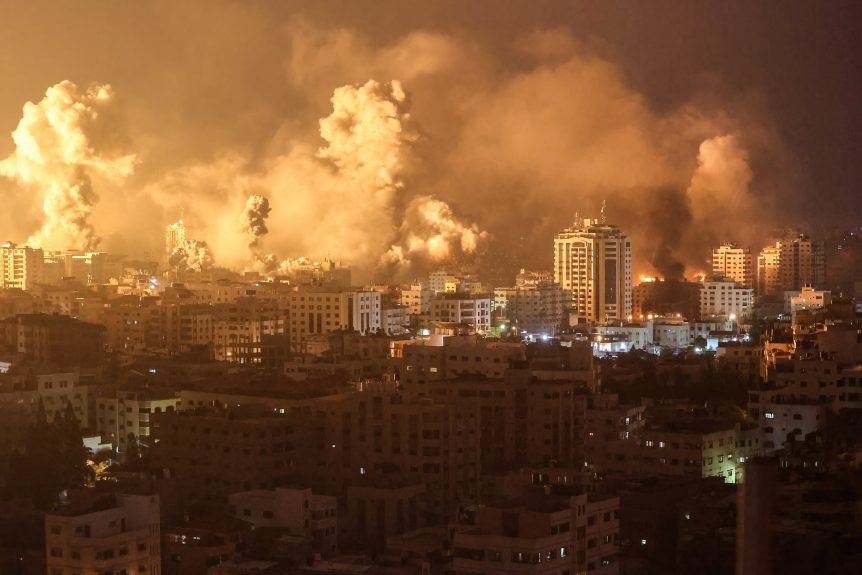As the civilian death toll continues to rise following the latest round of violence in Israel and the occupied Palestinian territory, the Cairo Institute for Human Rights Studies (CIHRS) is deeply concerned about the recent warning issued by Israel to the population living north of Wadi Gaza, home to around 1.1 million people, to relocate to the South of the Gaza Strip. This could amount to deportation and forcible transfer of the Palestinian population as well as risk of starvation and mass death among the civilian population in Gaza resulting from shortages of food, fuel and medicine under the siege imposed by Israel.
CIHRS also condemns the holding of Israeli and international hostages by Hamas, which represents a deliberate violation of international humanitarian law and calls for their immediate and unconditional release.
Following the 7 October attack on Israel by the Hamas, Israeli authorities have embarked on a retaliatory campaign against Palestinians, killing 1200 people including civilians, and have imposed a total siege on Gaza preventing the passage of goods, cutting water and electricity, all the while indiscriminately bombarding entire neighborhoods. The attacks have so far led to more than 1700 Palestinians including civilians killed, among them 326 children, according to the UN. Evidence has also emerged that the Israeli Defense Forces have used white phosphorus, a highly incendiary weapon, in densely populated areas, further compounding the risks to civilians.
These actions constitute an unprecedented escalation of the policy of collective punishment of Palestinians, which has long been part of Israel’s military doctrine. The deliberate and intentional imposition of methods of warfare that could lead to famine as well as the massive and indiscriminate bombardment of heavily populated areas, and most recently the order given to half of the population to evacuate to another part of the Gaza strip in 24 hours, constitute serious crimes under international law.
CIHRS reiterates its call on the international community to take urgent action for the cessation of hostilities, and the delivery of humanitarian assistance to the population besieged in Gaza. It calls on the ICC to expedite its investigations into war crimes and crimes against humanity committed since 7 October by all sides. CIHRS calls for “the creation of safe humanitarian corridors that allow for the sick and injured to leave Gaza and return as soon as the hostilities cease. “ CIHRS also underscores the moral and political responsibility of Arab countries to push all international parties to this action. CIHRS further reaffirms that this latest and bloodiest cycle of violence in decades is deeply rooted in the apartheid policy carried out by Israel and its 56 year-long illegal occupation of the Palestinian territories, which must be ended in order to avert more bloodshed.
It is imperative for all actors involved to adhere to international law, which requires respecting and protecting civilians and prohibits the deliberate targeting of civilian populations by all parties. The greenlight initially given by some key international actors to Israel to defend itself without recalling the need for restraint or adhering to the principles of international law, not only endangers Palestinian civilians and puts them at risk of starvation, displacement and other abuses, but it also profoundly flouts international norms and could seriously erode adherence to human rights in the future, both in the Arab region and internationally.
On 9 October, Israeli Minister of Defense Yoav Gallant announced that he had “ordered a complete siege on the Gaza Strip. There will be no electricity, no food, no fuel, everything is closed.” He continued, “We are fighting human animals and we are acting accordingly.” On 12 October, the Israeli Minister of Energy reiterated on social media the decision to impose a full siege “until the Israeli abductees are returned home.”
According to reports, the siege led to Gaza’s only power plant as well as generators powering hospitals to run out of fuel. According to an UNRWA report, “a water crisis is looming in UNRWA emergency shelters and across the Gaza Strip due to damaged infrastructure, lack of electricity needed to operate pumps and desalination plants, and limited supply of water in the local market.” While Egypt pledged on 12 October to deliver international aid to Gaza through the Rafah crossing, humanitarian assistance efforts have been hampered so far by Israel’s bombing of the crossing on the Palestinian side.
By declaring the entire Gaza strip, which is home to more than 2 million people including more than 1 million children, as a war zone and imposing a total blockade on it, the Israeli authorities have announced to the entire international community that they are intending to commit war crimes and crimes against humanity. While Israel has a long history of utter disregard for international law – from the non-application of UN resolutions mandating the end of Israeli occupation of Palestinian land to the indiscriminate bombing and shelling of civilians including in previous attacks on Gaza – this new escalation marks a turning point in the deliberate and brazen oppression of Palestinians.
Under international law, “deportation or forcible transfer of population” defined as the “forced displacement of the persons concerned by expulsion or other coercive acts from the area in which they are lawfully present, without grounds permitted under international law” is a crime against humanity. The intentional use of “starvation of civilians as a method of warfare by depriving them of objects indispensable for their survival, including impeding relief supplies” is a war crime that falls under the jurisdiction of the International Criminal Court.
Share this Post

